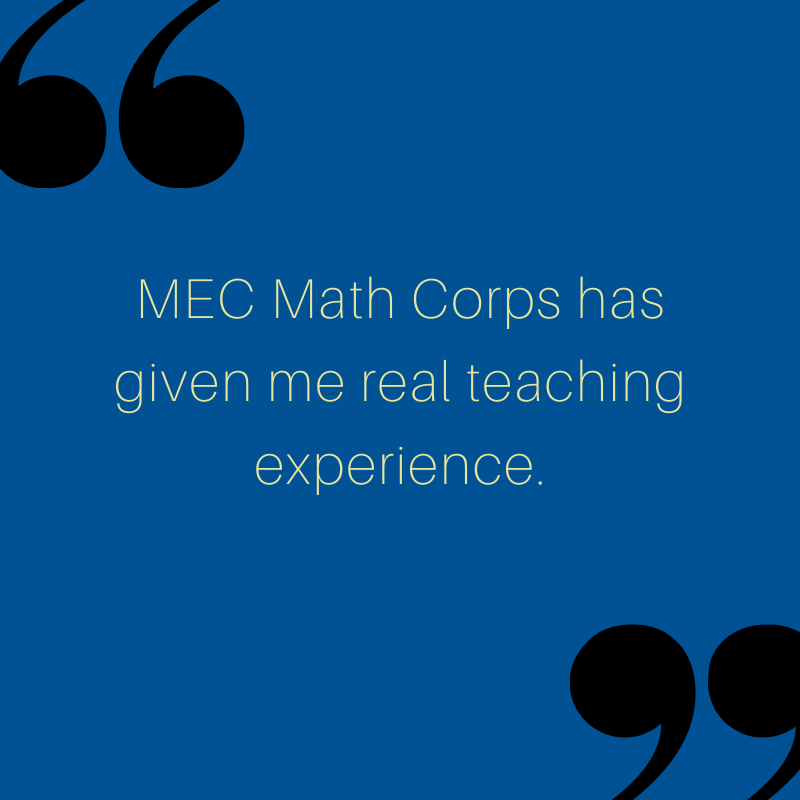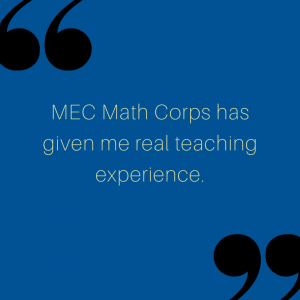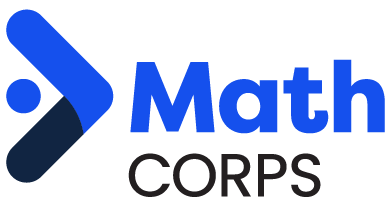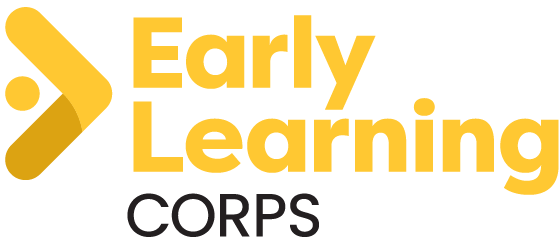
More Than A Practicum: Interview with Maddy Grose, MEC Math Corps Alum and Cornerstone University Student
More than a Practicum: An Education Student’s Experience with MEC
Interview with Maddy Grose, MEC Math Corps Alum and Cornerstone University Student
Maddy Grose is a senior at Cornerstone University. She is working toward a teaching degree in learning disabilities and secondary mathematics. She served as an MEC Math Corps Interventionist in the fall semester as a part of her practicum experience. Now, she is student teaching in Sparta Public Schools.
Q: You decided to use MEC Math Corps service to meet your practicum requirement for your degree. What led you to pursue this opportunity?
A: The practicum requirements and MEC Math Corps seemed to line up very well. Not only was I getting more experience than what I was required, but I was getting experience with a research based strategy in an area that I love teaching. In many practicum experiences, I was not in a classroom teaching as much as I wanted to. In MEC Math Corps, I was able to teach students for most of the days of the week.
Q: What are your career goals and how did MEC help you to move closer to reaching those goals?
A: My career goal is to work in a high school setting teaching both math and special education in some aspect. Although my ultimate goal is to teach in a high school, I will be certified to teach K-12 for special education. Therefore, I’m required to have experience in K-12. MEC Math Corps was my 4th and 5th grade experience, and it helped me realize that I would be willing to teach any grade. MEC Math Corps helped show me that each grade has a unique set of joys and challenges. The experience with 4th and 5th grade also helped me learn how to teach the foundational math that is needed for students to succeed at the high school level. Teaching those skills showed me that ensuring students understand now will help them succeed at their fullest potential in the future.
Q: In what ways has your service experience prepared you to be an educator?
A: MEC Math Corps has given me real teaching experience. Not in any other college level practicum or assisting experience have I been given a group of students and told to teach them entirely on my own. Although I was only teaching small groups of three students, I still learned incredible teaching skills like establishing expectations on the first day, building relationships, being a part of a community, and working as a team.
Q: What skills have you developed and strengthened through your service?
A: Collaboration and relationship building have been the skills I have seen the largest growth in. Working alongside teachers is absolutely necessary to help students succeed. Collaboration is also a very important professional skill that I will need when working as a special education teacher. There were many instances when I needed to work with students’ teachers for strategies to improve behavior, academic outcomes, and attendance. Working with a team has far greater benefits than trying to work alone. The other skill that I saw the most growth in myself was relationship building. I have always emphasized that teachers need to get to know their students and trust them before the students can learn. In MEC Math Corps, I was able to put this into practice. There was one group in particular that I worked with which had many distinct adverse behaviors. Getting angry at these students and forcing them to listen to me was not going to work. Instead, with this group only, I had them ask me one question about myself and in turn I could ask them one question about themselves. This took only a few minutes out of each session, and usually I did this in the hallway on the way to or from their classroom. This helped us build mutual trust in our group, and the three students trusted me to help them improve their math ability.
Q: What’s one lesson that you’ve learned through your service that you will take with you into your career?
A: The largest lesson I have learned is that students are people too. Often times, when learning about how to teach, I have viewed students as only buckets to collect all of the knowledge I was planning to give them. This is definitely not the case. Students have so much more than school that they are grappling with in their lives. Not only is a student overwhelmed with their areas of need in academics, but also their family, if they will eat that day, who is picking them up from school, and so many other concerns under the surface. Building a safe and predictable environment for a student where they feel safe to learn can make a huge difference in their life and future.
Q: How do you plan to use your education award?
A: Next semester at Cornerstone is my last semester. I will be student teaching in the Sparta Public Schools. I will use my education award to pay for my last semester at Cornerstone, which is a huge blessing and help towards completing my goal of becoming a teacher.
Q: Is there anything else you want to share about your experience serving with Michigan Education Corps Math Corps?
A: Although it may seem daunting and overwhelming at first, being able to teach students in an incredibly rewarding endeavor. You can literally see students learning each day, and you begin to know their strengths and areas of need. Being able to support students in those areas builds strong relationships and incredible skills that you cannot learn anywhere else.
The most surprising part of MEC Math Corps was being a part of a school community. The elementary school I served at in Kentwood welcomed me in and was excited for me to work with their students. I was truly a member of their school community, and I was incredibly excited for each day that I was there.








